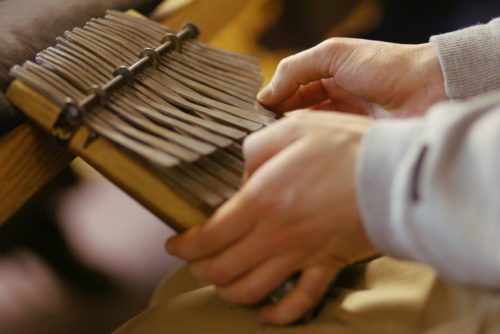Mbira Ensembles

Grades 9-Adult
Beginning Mbira Ensemble
Teacher: Glenn West
Monday, 6:30-8:00 p.m.
Room: ET 12
Advanced Mbira Ensemble
Teacher: Jennifer Kyker
Tuesday, 8:00-9:30 p.m.
Room: ET 12
Tuition: $160 per semester
Tuition with lessons (10% off): $144 per semester
Tuition with lessons and two or more concurrent 17-week classes or ensembles (15% off): $136 per semester
This is a yearlong course divided into two semesters.
The Eastman Community Mbira Ensemble is open to anyone regardless of experience. Beginning students will learn the playing techniques and be introduced to the basic repertory of the mbira dzavadzimu, the traditional instrument of the Shona culture of Zimbabwe. The Advanced Ensemble is open to individuals who are comfortable playing both parts of two fundamental songs (Kariga Mombe and Nhemamusasa).
Essential aspects of the music that will be learned and applied include the interlocking of different parts, traditional singing practices, rhythmic accompaniment, and the social and cultural context of the music. Students will also be guided to understand the music from the traditional Shona point of view as well as integrating it with their own musical understanding.
Native to the Shona culture of Zimbabwe, the mbira dzavadzimu (literally, “the mbira of the ancestral spirits”) is a diatonic instrument with 22 to 28 metal keys (lamellae) fixed to a wooden soundboard, which is then wedged to a gourd resonator, used to amplify its resonance. Rattling pieces of metal, bottle caps or shells are attached to the instrument, which in turn produce buzzing sounds when the keys are plucked. The interaction of two or more players, singers, hosho (gourd rattles), and sometimes drummers and rhythmic hand clapping creates a complex and sophisticated musical fabric that requires a shift in musical perspective of the listener and performer.
Inextricably tied to traditional Shona spiritual beliefs and cultural practices, the mbira and its repertory predate the arrival of European explorers in the 16th century. Some of the traditional songs are said to date back over 1,000 years. The sophistication of the instrument and the music, however, has also led to their adoption and adaptation by contemporary musicians in Africa, Asia, and the West. Repertory will be taught and performed without notation in keeping with the aural tradition of the music. Although participants will be assigned to either section based on their experience for the purpose of learning repertory, members of the ensemble are welcome to sit in on both sections for purposes of review or exposure to new repertory. The Advanced Ensemble is open to individuals who are comfortable playing both parts of two fundamental songs (Kariga Mombe and Nhemamusasa).
How to Register
New students and students registering after mid-September: ECMS Registration Form
Continuing ECMS students may re-register online from May until September.
Paper registration forms available upon request: (585) 274-1400
Once registered, students may begin attending classes. The only registration confirmation you will receive is your bill. You may log on to check your registrations at any time. Click here for complete details on registration and policies.
